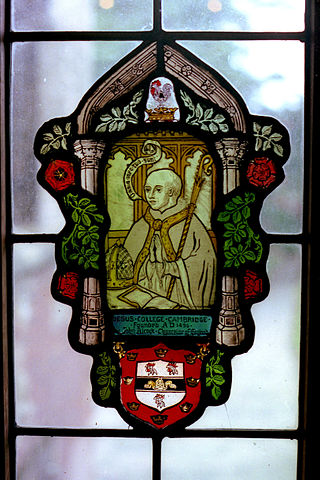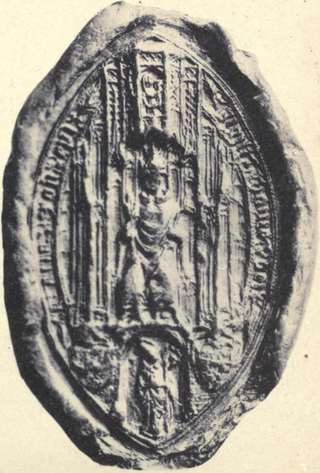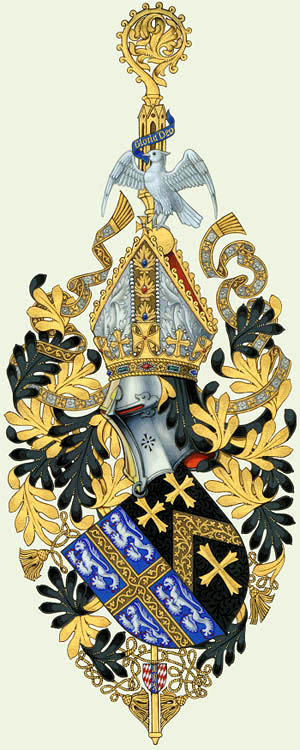Related Research Articles

Thomas Bourchier was a medieval English cardinal, Archbishop of Canterbury, and Lord Chancellor of England.

Simon Sudbury was Bishop of London from 1361 to 1375, Archbishop of Canterbury from 1375 until his death, and in the last year of his life Lord Chancellor of England. He met a violent death during the Peasants' Revolt in 1381.

John de Stratford was Archbishop of Canterbury, Bishop of Winchester, Treasurer and Chancellor of England.
William Courtenay was Archbishop of Canterbury (1381–1396), having previously been Bishop of Hereford and Bishop of London.
William of Wykeham was Bishop of Winchester and Chancellor of England. He founded New College, Oxford, and New College School in 1379, and founded Winchester College in 1382. He was also the clerk of works when much of Windsor Castle was built.
Robert Stillington was an English cleric and administrator who was Bishop of Bath and Wells from 1465 and twice served as Lord Chancellor under King Edward IV. In 1483 he was instrumental in the accession of King Richard III, leading to later reprisals against him under King Henry VII.

John Alcock was an English churchman, bishop and Lord Chancellor.
Michael Northburgh, otherwise Michael de Northburgh (Northborough), was the Bishop of London between 1354 and his death in 1361. He was the nephew of Roger Northburgh, Bishop of Coventry and Lichfield.
John de Halton, also called John de Halghton, was an English priest and Bishop of Carlisle from 1292 to 1324.
John Langton was a chancellor of England and Bishop of Chichester.

Thomas de Brantingham was an English clergyman who served as Lord Treasurer to Edward III and on two occasions to Richard II, and as bishop of Exeter from 1370 until his death. De Brantingham was a member of the Brantingham family of North East England.
John Kirkby was an English ecclesiastic and statesman.

John de Ufford was chancellor and head of the royal administration to Edward III as well as being appointed to the Archbishopric of Canterbury.
John of Thoresby was an English clergyman and politician, who was Bishop of St David's, then Bishop of Worcester and finally Archbishop of York. He was Lord Chancellor of England under King Edward III starting from 1349.

Thomas Hatfield or Thomas de Hatfield was Bishop of Durham from 1345 to 1381 under King Edward III. He was one of the last warrior-bishops in England.

John Fordham was Bishop of Durham and Bishop of Ely. Fordham was keeper of the privy seal of Prince Richard from 1376 to 1377 and Dean of Wells before being named Lord Privy Seal in June 1377. He held that office until December 1381.
Adam Orleton was an English churchman and royal administrator.
John Russell was an English Bishop of Rochester and bishop of Lincoln and Lord Chancellor.

William of Louth, also known as William de Luda was a medieval Bishop of Ely.
Lewis de Charleton was a medieval Bishop of Hereford in England.
References
- Fryde, E. B.; Greenway, D. E.; Porter, S.; Roy, I. (1996). Handbook of British Chronology (Third revised ed.). Cambridge, UK: Cambridge University Press. ISBN 0-521-56350-X.